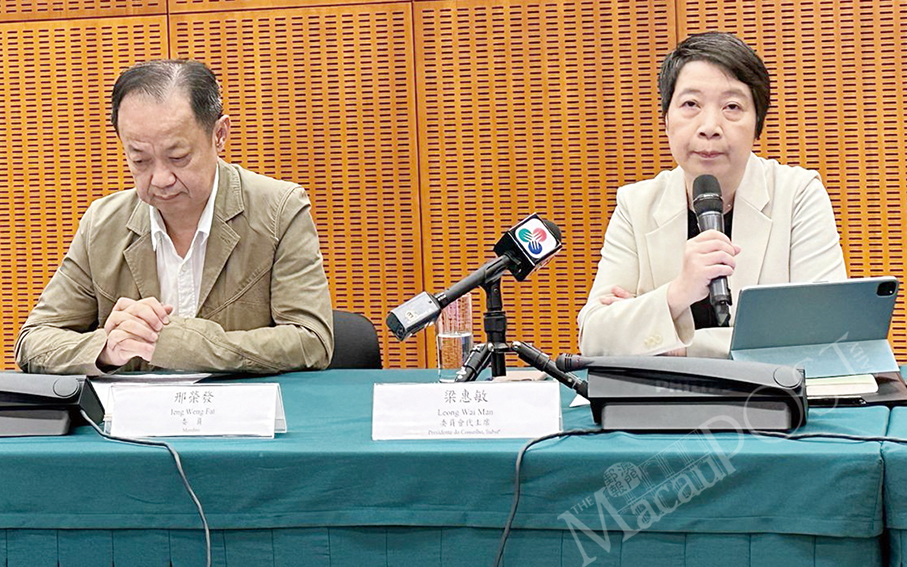I spent part of the long Workers’ Day weekend holiday in Zhuhai but still found some time to comb through a bundle of recent statistical economic reports and projections concerning Macau. Perhaps not the most relaxing way to spend one’s holidays, but I’ve been a statistics buff since my university years back in the 1970s.
According to the International Monetary Fund’s (IMF) latest “World Economic Outlook: A Critical Juncture Amid Policy Shifts”, published last month, forecasts Macau’s real economic GDP growth of 3.6 percent for this and 3.5 percent for next year. Concerning this year’s projection, that’s a lowering of 5.2 percentage points from last year’s 8.8 percent GDP growth, which sounds quite stark. However, on the other hand, the Washington-based lender gave Macau the highest expected GDP growth among the eight “Advanced Asia” economies, ahead of “Taiwan Province of China” (that’s the official term the IMF uses for the Chinese island) at projected GDP growth of 2.9 percent for this year, Singapore at 2.0 percent, Australia (as one of the IMF’s “Asian and Pacific Economies”) at 1.6 percent, the Hong Kong SAR at 1.5 percent, New Zealand at 1.4 percent, (South) Korea at 1.0 percent, and Japan at 0.6 percent.
Next year as well, Macau is projected to enjoy the highest GDP growth among the eight “Advanced Asia” economies – that’s not bad at all!
For the whole of the Asian and Pacific Economies, the IMF projects real GDP growth of 3.9 percent this and 4.0 percent next year, for “Advanced Asia”, its forecasts are 1.2 percent for this and 1.4 percent for next year.
The mainland Chinese economy, which belongs to the IMF’s “Emerging and Developing Asia” segment, is predicted to reach real GDP growth of 4.0 percent both this and next year, after last year’s 5.0 percent.
“Advanced Europe” is forecast by the IMF researchers to have to content itself with 1.0 percent GDP growth this year, while the United States’ one is predicted to reach 1.8 percent.
Incidentally, Fitch Ratings in a March report predicted Macau’s GDP growth to slow to 6.9 percent this year.
Well, forecasts should always be taken with a pinch of salt. The main problem with economic forecasts is their inherent uncertainty due to the complex and dynamic nature of economies, for economies heavily reliant on external factors such as Macau’s in particular. For instance, in the first quarter of this year, imports accounted for 89.7 percent of Macau’s total external merchandise trade, while the number of hotel guests shrank by 5.4 percent year on year to 3.57 million.
Macau’s Statistics and Census Bureau (DSEC) announced in a statement last week that our city’s GDP fell by 1.3 percent year on year in real terms to 99.78 billion patacas in the first quarter of this year.
Without elaborating, the statement attributed the decrease to a relatively high comparison base in last year’s first quarter, “changes in visitor consumption patterns and other factors”, as well as a 3.8 percent decrease in total exports of services, despite an 11.1 percent increase in visitor arrivals.
I agree with our government statisticians that “the decline in visitor expenditure has exerted pressure on the local tourism industry…., nevertheless, Macau’s economy has maintained an overall recovery trend [from the rather severe impact of the three-year COVID-19 pandemic on the local economy, between early 2020 and late 2022], with stable public finances and a positive outlook”.
The bureau also pointed out that “since the beginning of this year, the global environment has been marked by volatility and challenges, with subdued growth momentum for the world economy and increasing uncertainties in China-US relations”.
I may add that it would be ingenuous to believe that the world economy’s volatility caused by US President Donald Trump’s misnamed “Liberation Day” (I think it should be called “World Trade Disruption Day” instead), when he launched his “reciprocal tariff” strategy early last month, will spare Macau’s GDP any adverse impact – directly or indirectly, irrespective of its status as a free port and separate Chinese customs territory.
The last time that Macau suffered negative GDP growth year on year was back in the fourth quarter of 2022.
Now, let’s turn to positive economic figures, such as the Macau Special Administrative Region’s financial reserves of over 620 billion patacas (that’s more than about US$78 billion!) and zero public debt remain the envy of the world – and all this despite our city’s difficult economic predicament in the wake of the COVID-19 pandemic and its aftermath.
Macau and Norway are among the world’s very few economies that enjoy this enviable situation – Norway thanks to its sovereign wealth fund from oil revenues and Macau on account of its huge income from gaming taxes and levies that accounted for 88.4 percent of the government’s total current revenue as of March this year.
The DSEC statement also said that “on the whole, barring major changes in external and internal conditions, Macau is unlikely to face a cyclical economic downturn and is expected to sustain its recovery momentum.”
The phrase is forecasters’ typical “ceteris paribus” (“all other things being equal”, which one may also loosely translate as “provided that nothing changes”) approach to the changeability of economic conditions in the real world.
“Barring major changes… Macau is unlikely to face a cyclical downturn…” is a rather sweeping statement for a statistics agency. I am of the view that statisticians should primarily focus on data analysis, probability, and modelling, while economists should focus on policy impacts, institutional frameworks, and the interpretation of data within theoretical contexts. Perhaps, the statement is the result of a more econometric (statistics + economic theory) approach by the bureau to the interpretation of statistical data.
Forecasting a cyclical economic downturn requires a combination of economic theory, statistical modelling, and real-time data analysis. Close cooperation between statisticians and economists would be the best approach – economists interpreting economic trends and policy impacts, while statisticians detecting early signals from complex datasets.
The bureau also announced in its statement that starting from the first quarter of this year, it will release preliminary GDP figures – aka “advance estimates” – about a month after the end of each quarter, publishing the revised figures later on, with the aim of providing more timely GDP data to the public. It also said that revised GDP data for the first quarter of this year were slated to be released on May 16, i.e., a mere fortnight after publishing the preliminary data.
I wonder whether two weeks makes such a big difference of time between the release of preliminary and the (first issue of) revised GDP figures, considering that, according to international practice, GDP data are, anyhow, revised multiple times (often even more than twice), the third estimate usually being the “final” release, aside from annual revisions and benchmark revision every five years.
After all, in statistics, “final” customarily means “final for now.” Revisions are a feature, not a flaw, as they reflect progress in measurement accuracy. Statistics, as science in general, is a never-ending process.
Applied statistics is distinct from pure mathematics – the former aims to tackle real-world problems using data, while the latter’s objective is to prove theorems and structures
I would like to conclude my editorial by reaffirming that I have regarded our Statistics and Census Bureau as one of Macau’s best-run government entities since I started working in Macau four decades ago. I have used the bureau’s data extensively – and gratefully – in my work as a journalist.
Keep refining your methods and deepen your partnership with economists! We will all benefit from it.
Last but not least, based on the local and international statistical and econometric data that I have been scrutinising recently, I believe that Macau’s economic outlook for this and next year is cloudy but not bleak. That’s good enough, bearing in mind the global economic turbulence primarily caused by Trump’s disruptive weaponisation of US tariff policies.
I concur with nonagenarian US investor Warren Buffet when he said last week that “trade should not be a weapon”. Instead, trade should promote progress, development, prosperity, and the common weal – that’s my stand.
– Harald Brüning








